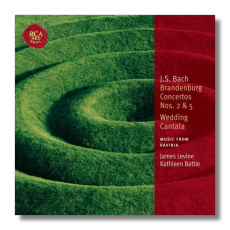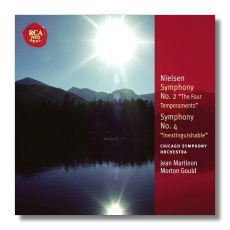
The Internet's Premier Classical Music Source
Related Links
- Latest Reviews
- More Reviews
-
By Composer
-
Collections
DVD & Blu-ray
Books
Concert Reviews
Articles/Interviews
Software
Audio
Search Amazon
Recommended Links
Site News
 CD Review
CD Review
RCA Red Seal Classic Library

Gustav Mahler
- Symphony #1 "Titan"
- Lieder eines fahrenden Gesellen
Frederica von Stade, mezzo-soprano
Philadelphia Orchestra/Eugene Ormandy
London Philharmonic Orchestra/Andrew Davis
RCA Red Seal 82876-76233-2 ADD 71:34


Johann Sebastian Bach
- Brandenburg Concerto #2 in F Major, BWV 1047
- Brandenburg Concerto #5 in D Major, BWV 1050
- Cantata #202 "Weichet nur, betrübte Schatten"
- Orchestral Suite #2, BWV 1067
Kathleen Battle, soprano
James Galway, flute
James Levine, harpsichord
Music from Ravinia/James Levine
Württembergisches Kammerorchester Heilbronn/Jörg Faerber
RCA Red Seal 82876-76222-2 ADD/DDD 78:20


Carl Nielsen
- Symphony #2 "The Four Temperaments", Op. 16
- Symphony #4 "The Inextinguishable", Op. 29 *
- Helios Overture, Op. 17 *
- The Fog is Lifting, Op. 41 **
** James Galway, flute
** Sioned Williams, harp
Chicago Symphony Orchestra/Morton Gould
* Chicago Symphony Orchestra/Jean Martinon
RCA Red Seal 82876-76237-2 ADD 77:14
These are three recent releases in Sony/BMG Music entertainment's "Classic Library" series. This is a mid-priced series whose value is ensured by intelligently selected music and performances, and increased by well-written booklet notes.
Ormandy's "Titan" is undervalued. It's true that the conductor does not emphasize the symphony's emotional contrasts, and maybe he could have been more gripping and idiomatic in the last movement. However, what he gives us in return is a performance of great warmth and affection: a Mahler who doesn't stomp around and frighten the children, if you will. This is story-telling, not an existential struggle. Ormandy's recording includes the so-called "Blumine" movement, discarded by Mahler around 1896, but rediscovered in the late 1950s and donated to the Yale University Library. Ormandy was not, as some have claimed, the first conductor to record "Blumine." That honor goes to Frank Brieff, with the New Haven Symphony Orchestra. He was, however, the second, and unlike some conductors who have included "Blumine," he places it where it belongs, between the first and usual second movements, where it makes a great deal of musical and emotional sense. Here in particular, the Philadelphia Orchestra's playing is lovely and full of nostalgia. This 1969 recording has not appeared on CD before. It sounds better than I ever could have imagined. The sound is rich, and the instruments are thrillingly placed within the stereo panorama. (There's definitely been some "spotlighting" of individual instruments though.)
The Songs of a Wayfarer are conducted with a lot more heat by Andrew Davis – again, not a conductor I associate with Mahler, but one who has done himself proud on this occasion, with a reading strong on drama and detail. The real selling-point, however, is Frederica von Stade, who sings these songs with intelligence, and with unforgettable poignancy and beauty of tone. One almost forgives her for being the wrong gender! This recording was made in 1978 and still sounds fabulous. The sung texts and English texts have been included as well.
Most of the Bach disc is a souvenir of the Chicago Symphony Orchestra's summer festivals at Ravinia – hence, "Music from Ravinia." In other words, the players for the two Brandenburg Concertos and "Weichet nur, betrübte Schatten" (better known as the "Wedding Cantata") are associated with the Chicago Symphony Orchestra. The Brandenburg Concerto #2 is a vehicle for CSO trumpeter Adolf Herseth, and in the Brandenburg Concerto #5, Maestro Levine, conducting from the harpsichord, shares solo duties with flutist Donald Peck and violinist Samuel Magad. The recording dates from 1977 and was made, not at Ravinia, but in Chicago's Medinah Temple.
Levine is esteemed for his Verdi and for his performances of German repertoire from the Romantic period, but not so much for the Baroque period. This is big Bach: enjoyable, but a little self-conscious and heavy. It's not exactly unstylish, but it's hardly the last word in authenticity. (Modern instruments are used.) The most enjoyable aspect of these performances is hearing the CSO's lead players turn their considerable talents to repertoire in which we don't usually hear them. In the "Wedding Cantata," Levine and the Chicagoans are joined by soprano Kathleen Battle, who was quickly becoming a star at this time. Her voice is absolutely lovely here, with all the bright springtime clarity one would expect from it at this point in her career. Having said that, I must also add that Battle makes little of the texts, and that she also does little with the voice itself in terms of fine-tuning the music's emotions. Once you get past the beauty of the voice, one is left merely thinking "How cute!" about the interpretation. Is it enough? For me, Battle's is a "Stepford soprano" performance – gorgeous and satisfying, but only as long as one doesn't look into it too deeply. Texts and translations have been included.
Much the same could be said of Galway's Orchestral Suite #2, recorded in 1991 on modern instruments. This is a lovely performance in terms of pure sound, but less enlightening when it comes to the music's emotional and intellectual content. Both here and on the rest of this CD, one could argue that physical beauty, when it is taken this far, justifies both itself and shortcoming in other areas. Maybe. I can't say that my ears weren't totally pleased by these performances, and also by the engineering.
Many Americans did not get their first taste of Carl Nielsen's music until the 1960s, thanks to performances and recordings by the likes of Leonard Bernstein, Eugene Ormandy, André Previn, Morton Gould, and Jean Martinon. The recordings of the Second and Fourth Symphonies reissued here were recorded within a few months of each other in 1966. Gould was an occasional guest conductor in Chicago whose 1966 recording of Ives' Symphony #1 won a Grammy. Martinon was the Orchestra's Music Director between 1963 and 1968 – an unhappy period, because the "fit" between Martinon and the Chicagoans turned out to be a poor one.
In 1966, it was easier to approach these two symphonies with a kind of innocence because of their unfamiliarity. In both recordings, there's a sense of discovery. The music-making is high-powered, and one could argue that neither Gould nor (especially) Martinon finds all of the music's depth and darkness. I also wonder about the long pause between the third and fourth sections of "The Inextinguishable" – is this Martinon's doing, or RCA's? Still, these are exciting, even brash, performances, and the brilliant playing of the Chicago Symphony Orchestra increases the desirability of these recordings. Martinon's Helios is an unqualified success – no reservations here. The engineering gives the orchestra a somewhat hard sound and is characteristic of the era. (Nevertheless, the Martinon is regarded as an audiophile recording by many.)
A bit of Nielsen's incidental music from The Mother provides a gentle anti-climax at the disc's close.
Copyright © 2006, Raymond Tuttle




















